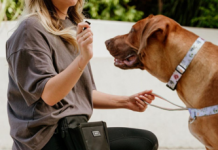It’s terribly sad, but not at all uncommon to have an elderly dog lose his vision as he ages. More often than not, this is a gradual process that can be identified early on. If you notice any signs that your dog is going blind, take him to a vet to confirm and see if there are any other problems that may have arisen. Beyond that, love on your dog more than ever before, as losing eyesight is sometimes a sign that their health will be declining in the months and years to follow.
We’ve created a list of things you can do to help re-train your blind dog and keep him happy during this difficult time.
Re-train with verbal commands
Once you determine your dog is losing his eyesight, you’ll need to re-train him with verbal commands. You may not even know you’re doing it, but many of your commands right now may be visual. For example, you’ll point to his bed as you tell him to go get in his bed. He relies on this visual almost more than the verbal, so you’ll want to recognize and correct your commands to accommodate his needs. Be graceful, as sometimes it can be difficult to re-train older dogs.
Reinforce commands with a clicker and treats
Clicker training is going to be very helpful as you re-train him for verbal commands. Training him with a clicker is one effective way to reinforce good behavior the moment it happens with a small sound. So, the second your dog’s bottom hits the floor when you say, “sit,” press the clicker. Follow up with a pat on the head and his favorite treat, and he’ll be much faster to learn the verbal commands without a visual aid.
Dog-proof your home again
For his safety, you’ll want to go throughout your home to remove anything that could potentially be dangerous. Since he can’t see, he’ll be more likely to walk into things, step on things, and venture places he doesn’t belong. Clear a path that doesn’t change for him to get used to, and keep stairwells and other dangerous areas gated off so he doesn’t accidentally fall.
Keep things familiar
Don’t change things up on your dog, keep everything the same. Dogs have great noses for finding things, so he should be just fine to locate his food, water, toys, bed and treats as long as you keep them where they usually are. Keep in mind that he’ll rely on his nose and his routine more since his vision is gone, so accommodate that as much as you can.
Engage other senses
He may not be able to fetch in the old fashioned way anymore, but you can still play with him and help him to sharpen the other senses that remain. You can actually purchase scented toys from pet stores and use them to interact with your dog. Teach him to fetch scented toys, rather than sticks, and to bring them back to you.
Without question, do not get frustrated with your dog’s new handicap. He’s likely confused and probably a little bit scared, so do your best to be patient with him and love on him like never before.












